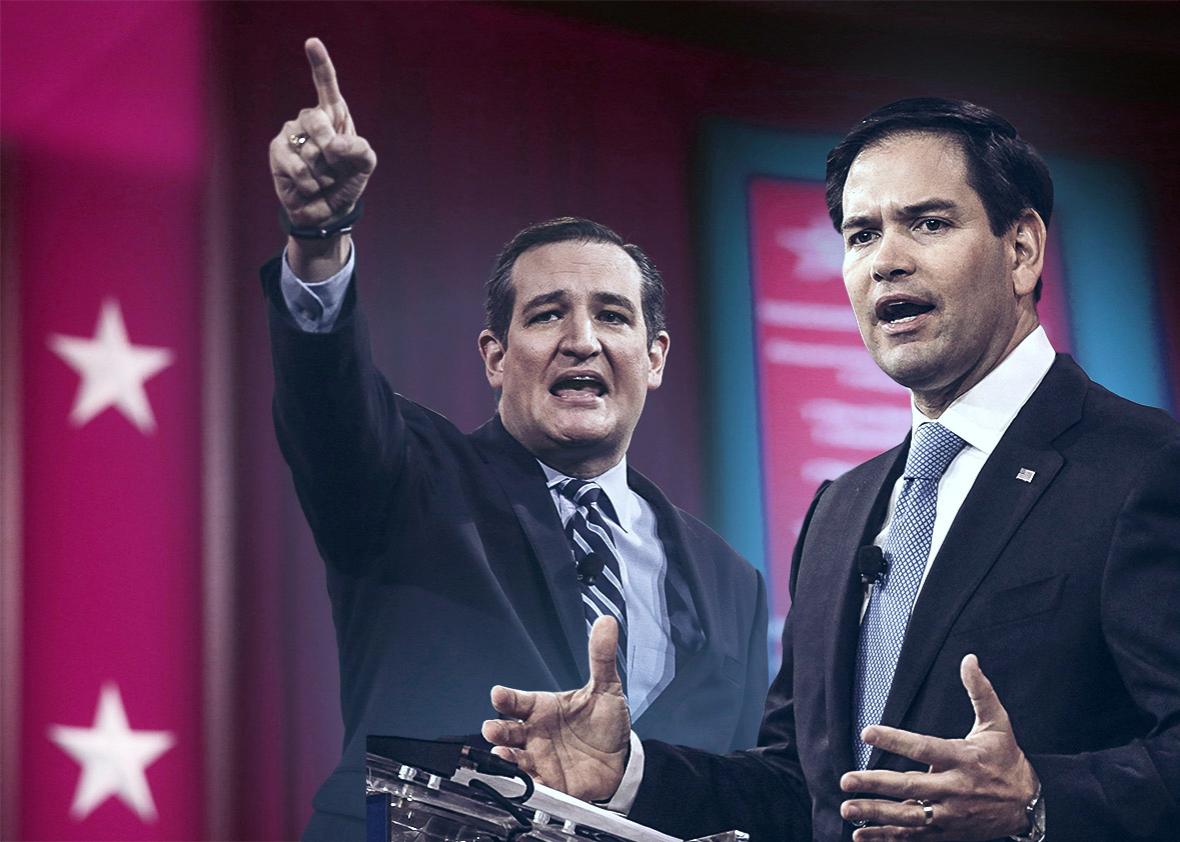On Tuesday, at the Republican presidential debate, Texas Sen. Ted Cruz took his first steps toward hitting his chief “establishment” rival, Florida Sen. Marco Rubio, on immigration. “For those of us who believe people ought to come to this country legally and we should enforce the law, we’re tired of being told it is anti-immigrant,” said Cruz. “Every sovereign nation secures its borders, and it is not compassionate to say we’re not going to enforce the laws and we’re going to drive down the wages for millions of hard-working men and women.”
The next day, campaigning in New Hampshire, Cruz went even further, finally taking a direct swing at Rubio and others who have supported immigration reform. “Last night, you listened to one Republican after another who said, ‘Gosh, it would be mean to enforce our immigration laws,’ ” said Cruz at a Veterans Day town hall in Kingston. He continued: “And I would point out, by the way, everyone talks about how compassionate it is to grant amnesty to 12 million people here illegally. … They’re very compassionate, but it’s not very compassionate if I say, ‘I’m going to give away your job.’ That’s the opposite of compassion.”
Cruz is staking his attack on Rubio’s role in crafting and shepharding the Gang of Eight immigration reform bill in 2013. That bill—crafted by Sens. Michael Bennet, Richard Durbin, Jeff Flake, Lindsey Graham, John McCain, Bob Menendez, Chuck Schumer, and Rubio—was in line with President Obama’s “principles” on comprehensive immigration reform, with calls for more border security, a pathway to citizenship, stronger employee verification measures, and fixes for the legal immigration system. There were differences—the Senate bill had a longer path to citizenship that was contingent on more and greater border security—but overall it had Obama’s support.
Grassroots conservatives, however, hated the bill, and by the end of the year, Rubio had abandoned the push for comprehensive immigration reform on procedural grounds. “At this point, the most realistic way to make progress on immigration would be through a series of individual bills,” said Rubio spokesperson Alex Conant that October.
Cruz hopes that conservatives will remember Rubio’s role in “amnesty” and punish him accordingly. “He opposed every single one of them. Every single amendment,” said Cruz in an interview with conservative radio host Laura Ingraham referring to amendments for border security in the Gang of Eight bill. “It’s not like people were quiet in sharing their concerns at the time.”
But Rubio has an answer for this: We’re not so different, you and I. “Ted is a supporter of legalizing people that are in this country illegally,” said Rubio on Thursday. “In fact, when the Senate bill was proposed, he proposed giving them work permits. He’s also supported a massive expansion of the green cards. He’s supported a massive expansion of the [H–1B] program, a 500 percent increase.” Rubio continued: “If you look at it, I don’t believe our positions are dramatically different.”
There’s more. As a domestic policy advisor to George W. Bush in the 2000 presidential campaign, Cruz helped the then-Texas governor craft an immigration policy in line with Bush’s “compassionate conservatism” and his declaration that “family values do not stop at the Rio Grande River.” To that point, the Bush plan called for a fast application process, more work visas, and new rules allowing relatives of permanent residents to visit the United States while their applications were pending.
With that said, Cruz has wiggle room. During the campaign, Bush stated his opposition to “blanket amnesty” and citizenship wasn’t a part of his policy package. More importantly, by the time President Bush embraced comprehensive reform, Cruz had left the administration. He had no part in Bush’s plan. What’s more—while Cruz was open to a form of legalization—it’s also true that his amendment to the Gang of Eight bill precluded citizenship for anyone who received legal status after entering the country illegally. He’s also begun to walk back his statements on expanding the H1-B visa program.
Cruz may not be as anti-amnesty as he says, but he’s still a hardliner with a broadly restrictionist approach for immigration policy. He opposes the president’s deferred action and has pledged to end all of Obama’s executive actions. By contrast, Rubio is still open to a path to legalization—albeit very long—and won’t say when he’ll end the president’s program for “DREAMers.”
And there’s still the problem of the Gang of Eight bill. Rubio wasn’t just an architect and a supporter, he was an advocate. “We just have to get this thing done for once and for all,” he told the New York Times that January. Before it was clear he was on the wrong side of grassroots Republicans, he slammed the Heritage Foundation for its analysis of the bill and urged conservatives to embrace the Senate proposal.
Rubio wants to muddy the waters to avoid Cruz’s attack. But his record is too deep. That Cruz was in favor of legalization for some immigrants doesn’t erase Rubio’s history with comprehensive reform and what conservatives label “amnesty.” Given grassroots hostility to immigration, this gives Cruz the advantage. And judging from his campaign so far, I expect the Texas senator to press it.
